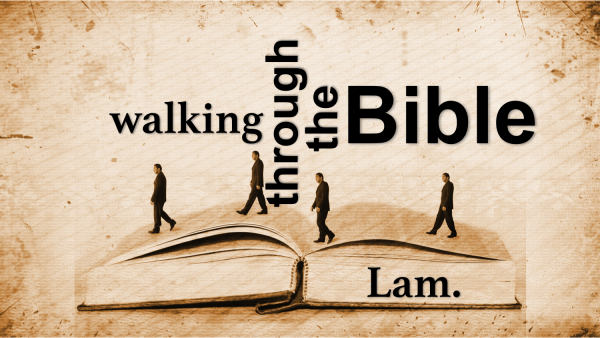There is no internal reference to whom the author of this book is, but many evidences and testimonies point to Jeremiah as the obvious choice. Of course, the first piece would be the strong connection of emotion between Jeremiah’s prophetic book and Lamentations in addition to the fact that they discuss the same events and were written in the same period. However, included would be the fact that “Jewish tradition, as far back as we can go, ascribes the authorship to him” (J. Sidlow Baxter). A final great explanation was provided by Stan Crowley when he wrote:
“Perhaps the strongest repudiation of the suggestion of another author or other authors is the challenge of “Who else?” What other known or inferred historical figure but Jeremiah would have felt such strong personal affiliation with and sympathy for Jerusalem that would have been poured forth with such sorrow, lament, and motion? So intimately is his own spirit identified with the afflictions of the nation that in some verses it is difficult to determine if it is the prophet himself or the nation personified that is speaking. C.J. Ellicott states, “There is absolutely no other writer living at the time to whom it can be ascribed with the slightest shadow of probability.”
The book itself is described as “poems of grief over the destruction of the city and the captivity of the Jews” (Dunn). It has a similar structure in the original Hebrew language as that of Psalm 119, which is comprised of twenty-two equal sections of eight verses each. Each of those “stanzas” begins with a letter of the Hebrew alphabet in ascending order through that alphabet. Similarly, the book of Lamentations has been described in the following way:
“Lamentations differs in that chapters 1, 2, and 4 are written in acrostic form using the 22 letters of the Hebrew alphabet in succession—verse 1 begins with aleph, verse 2 begins with beth, etc. Thus, chapters 1, 2, and 4 contain 22 verses each (chapter 5 also contains 22 verses but in irregular arrangement). However, chapter 3 contains the style in triplicate, so there are 66 verses in the chapter” (Todd Clippard).
Each chapter of the book contains an individual, unique lamentation with a special emphasis. Dunn divided them up as:
1. Chapter 1—the way of wickedness;
2. Chapter 2—the wrath of God;
3. Chapter 3—the weight of sorrow;
4. Chapter 4—the want of help;
5. Chapter 5—the wreck of iniquity.
Obviously, though, the central theme of Lamentations is the same as the central theme of the Old Testament and that is the Messiah to come. He is pictured in Lamentations as Jeremiah who weeps over the city, for six centuries later, it was Christ who wept over the same city in and equally emotional way: “O Jerusalem, Jerusalem, thou that killest the prophets, and stonest them which are sent unto thee, how often would I have gather thy children together, even as a hen gathereth her chickens under her wings, and ye would not! Behold, you house is left unto you desolate.” The people, in general, has gotten no better as accepting God’s will over the centuries that divided them, and thus as He prophesied in Matthew 24, they received the same end—destruction.
The book of Lamentations is a much neglected book, many times lost amongst the size of the other of the major prophetic books. However, its message is still pertinent today as Christians, like Jeremiah, weep over the state of their brethren, nationally and spiritually.

